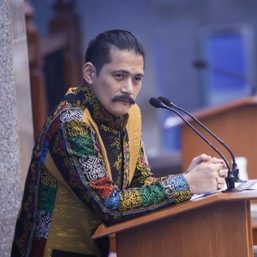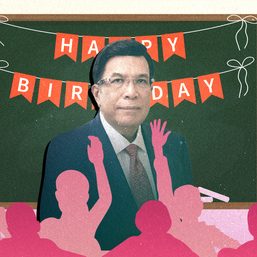SUMMARY
This is AI generated summarization, which may have errors. For context, always refer to the full article.
![[The Slingshot] Can the Quiboloy sect be outlawed?](https://www.rappler.com/tachyon/2024/03/Can-quiboloy-be-outlawed-March-26-2024.jpg)
Outlawing borderline religious sects is never a black-or-white question. These sects typically use the guise of religion to exist. As such, the universal exercise of religious freedom that the Philippine Constitution also enshrines protects them.
However the reality exists too that many such groups have the potential to engage in illegal activities. Sociologists opine that religious sects become borderline and turn into cults when they are led by charismatic self-appointed leaders who require severe membership controls and piety to a set of rules considered deviant by society. Tennessee State University, in its presentation on Cults in America, also made a similar definition and the usual profile of cult leaders.
The religion sociology scholar Jayeel Cornelio made a highly illuminative perspective in Rappler of the consequences of charisma of Apollo Quiboloy. Cornelio posits that the Quiboloy worldview imposes upon his sect members a “high demand, high control” belief that results in pervasive fear among them. Followers donate money to him even if they are already mired in debt, so as to please “god.” Female “pastorals” alleged they were prodded to sleep with him because it is a divine privilege, that sex with Quiboloy is the “will of god.”
Worldwide, there is an extremely adverse public view of cults. One such academic survey concluded that fear of cults is general and was specifically conducted way back in 1992 to explore the idea of outlawing them, because actual behavior harming people was present.
Such fears of cults are not unfounded. We can only look back to the 1978 Jonestown Massacre in Guyana, South America when 918 people in the Peoples Temple sect commune died after drinking grape Flavor Aid laced with cyanide. Its paranoid leader Jim Jones preached what he called “apostolic socialism” that was pro Soviet Russia. Using the approach of mass fear that authorities were out to annihilate the sect’s members, Jones effectively achieved mind control and the behavior modification techniques he borrowed from North Korea and Red China.
Jones planned the massacre cum mass murder that he called “revolutionary suicide.” The sect was also well armed. There was resistance from some members who refused to die, but guards of his so-called Red Brigade shot them. Jones would continually goad members that night of the massacre that “death is a friend.” There were babies and children. Jones had recorded the exact time of the massacre in what is now known as the chilling “Jim Jones Death Tape.”
What was the annihilation that Jones feared? He claimed a US government conspiracy against him, that the press had pilloried him, and that he was now “a dying man” because of all that persecution. The uncanny similarities to Quiboloy’s angry rants in his voice message on February 21, 2024 (since removed from YouTube?), resurrected fears of a mass suicide a la Jonestown, Guyana. In his voice message, Quiboloy had also said that he was now “a living dead.” It was not unlike a mind conditioning statement for the benefit of his sect members to motivate them to support him come hell or high water.
The social pattern is typical: charismatic leaders turning deranged, as Jim Jones had. David Koresh of the infamous Waco, Texas siege of 1993 was also of the same dysfunctional mold. As head of the Branch Davidians, he claimed to be God’s final prophet on earth and that he had direct lineage to the Biblical King David. Yet the prophet slept with many of the sect’s women. He said his aim was to sire 24 offspring who will serve as the “twenty-four ruling elders” of the millennium after the return of the second Christ. One girl chosen to have sex with him was underage and was actually the sister of Koresh’s legal wife.
The practices inside the cult were, to say the least, bizarre. Koresh would annul marriages of couples joining the cult so that he would have exclusive access to the women.
The psychiatrist who had examined 21 rescued children during the siege concluded that the children were “likely exposed to inappropriate concepts of sexuality,” and subject to “a whole variety of destructive emotional techniques…including shame, coercion, fear, intimidation, humiliation, guilt, overt aggression and power.” The children also said that “David Koresh was God, and hence he was not to be questioned.”
Koresh had also stockpiled weapons, the same allegation that had also been thrown at Quiboloy. When he was detained in the Honolulu airport in 2018, rifle parts were among those seized by US authorities in his private jet.
While Koresh admitted the multiple sexual relations, Quiboloy denies forcing his female pastorals into having sex with him. Among his accusers were two Ukrainian women and a Filipina who said Quiboloy allegedly had raped them. The Filipina said she was only a minor when it happened. Quiboloy claims women run after him because he is single and is wealthy.
One problem in the search for illegal loopholes among cults is how they can change objectives at the drop of a hat. Because narcissistic leaders rule them, the “religious” tenets or policies they hold can change on a whim. We actually witnessed this in the House hearings on Quiboloy’s SMNI television franchise. His lawyer who was being grilled by congressmen suddenly announced that Quiboloy was no longer connected with SMNI, that he was just its “honorary chairman.”
Accountability
The distinct possibility that this was done to escape accountability is not remote. Unfortunately, this instead proved to be one of its illegal conducts – a franchisee’s change of ownership was not reported to authorities, a violation of the franchise.
While the idea of outlawing cults is a tricky one, there is also a general inability of most country’s law enforcement and criminal justice systems to disband them. And that is exactly what senator Risa Hontiveros is doing by breaking the ceiling – begin first with investigations and find out if Quiboloy’s Kingdom of Jesus Christ had broken laws.
The question on Quiboloy is even a trickier one because he has taken up as part of his apostolic mission a populist pseudo-political aim: the support of Rodrigo Duterte and his dynasty, including their predilection for extrajudicial killings.
In the US, a private non-profit organization called the Cult Education Institute assists doomsday cult members in deprogramming their conditioned minds to help them leave cults. But such kind of public assistance is absent in the Philippines where legislators often turn to mega-churches for political support during elections. Quiboloy claims he has 7 million followers. Whether true or not, politicians will be foolhardy to disappoint the possible support it can get during elections.
Bloc voting in the Philippines by religious movements such as the Iglesia ni Cristo (INC) is closely intertwined with patronage politics and recognition for the group. In February 2018, Rodrigo Duterte appointed the INC’s executive minister Eduardo Manalo as his special envoy for overseas Filipino workers. Ferdinand Marcos reappointed Manalo in September 2023. Previously in 2009, Republic Act 9645 was passed, declaring July 27 of every year as Iglesia ni Cristo Day, a special national working holiday.
Bloc voting is also a coercive practice as prohibited by our Omnibus Election Code’s Article XXII Section 261 – Prohibited Acts under Election Offenses. It impinges upon the constitutional right of any voter to vote according to conscience without intimidation. Yet no politician has the guts to investigate the INC on it.
Criminal activities
The reality is that while cults are generally seen as legal on the basis of the constitutional right to freedom of religion, many such are actually illegal because of their aberrant practices.
Of the many countries that are facing the conundrum of cults in their backyards, we can learn from the European Parliament. Sometime ago, its directorate-general published working papers to address cults in Europe. While conscious that it is treading on the balancing rope of religious freedom, it uses a resolution adopted by the European Parliament Committee on Civil Liberties and Internal Affairs in February 1996.
That resolution binds the European Union’s member states to exchange information on the conduct of cults in Europe. Then it calls on member states to do “the best way to restrain their undesirable activities and on strategies to raise public awareness about them.” For that it has set the essential context: Are human rights violated? Are political and religious freedoms violated? Are these cults devoting themselves to “murky or criminal activities and aimed to pervert the values and ideas which had built up and developed European societies”?
In the case of cults involved in undercover or criminal activities, the resolution actually empowers member states to withdraw the grant of religious status. As a result, a line was drawn between freedom of religion and criminal activity.
The Senate’s order for Quiboloy’s arrest for contempt is the least of his problems. His bigger problem is the case of qualified human trafficking filed by the Department of Justice. It is a non-bailable crime. He can be jailed together with petty criminals and drug addicts. Once in jail, government can easily transport his whereabouts to the US once it succeeds in its request for his extradition. It is even possible that all his grand properties can be garnished by the state.
Duterte will be a paper tiger as property custodian once the International Criminal Court arrests him together with his daughter and his two fist-waver senators. The end of the Dutertes and of Quiboloy is crossly intertwined. And it must happen.
But it is also the Hontiveros committee’s efforts that can lead to the possibility of legislation for a thorough monitoring of sects and their criminal activities without outright outlawing them. – Rappler.com
1 comment
How does this make you feel?




![[OPINION] Rodrigo Duterte and his ‘unconditional love’ for China](https://www.rappler.com/tachyon/2024/04/rodrigo-duterte-xi-jinping-august-2019.jpeg?resize=257%2C257&crop=91px%2C0px%2C900px%2C900px)



![[The Slingshot] Lito Patay’s 4 hours and 38 minutes of infamy](https://www.rappler.com/tachyon/2024/07/Lito-Patay-4-hours-infamy-July-19-2024.jpg?resize=257%2C257&crop=233px%2C0px%2C720px%2C720px)
I agree: “… there is also a general inability of most country’s law enforcement and criminal justice systems to disband them.” And in our country, “… the Hontiveros committee’s efforts that can lead to the possibility of legislation for a thorough monitoring of sects and their criminal activities without outright outlawing them.” Yes, it is possible, but Quiboloy’s minions at the Senate will undoubtedly give her a tough time. So, that is how our powerful cults have dominated all three branches of our government.